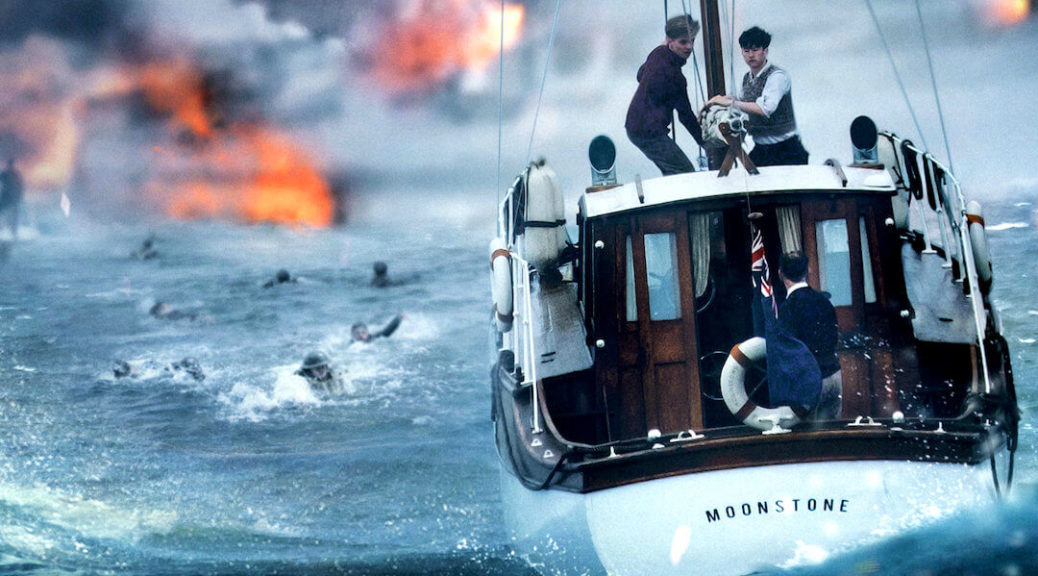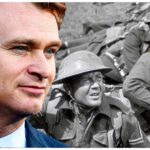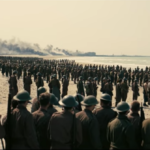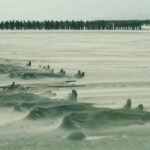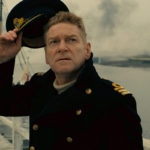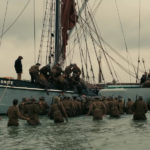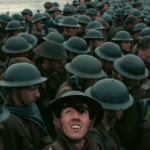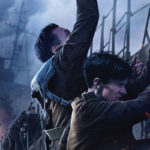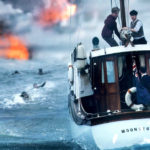Not having seen the 1958 film Dunkirk, whose director was Barry Norman‘s dad Leslie, my favourite depiction of this momentous event in the history of WWII, the moment that inspired the allied fight back, comes in Atonement. There is a momentous extended shot filmed on Redcar beach that captures exactly the chaos, fear and sheer scale of the operation as exhausted, injured and desperate squaddies wait to be evacuated.
In Christoper Nolan‘s epic reconstruction, one of the few remaining officers suggests there are 400,000 on the beach, though from what we see a mere fraction have been employed as extras. Cut-down cast notwithstanding, I think Nolan, director, scriptwriter, co-producer and tea boy (no sorry, I made the last one up) has done a fine job in recreating the atmosphere of wartime. We who were not there can never know what it was like on the beach on the day of that fateful evacuation.
But even then that’s not the point of Nolan’s film to capture the scale. This is Dunkirk in miniature, a raw and intimate movie where hand-held camera films grainy images in washed-out colours, focusing on the faces framed against the wide open beaches, the blue skies and the heaving seas. Faces filled with anguish, with pain, faces under water faces waiting anxiously. Rarely if ever are jovial faces on display, as you might expect.
Some have criticised him for the fact that this is almost all about white male faces (though there is one black face I noted), irrespective of the historical fact that almost all evacuees were white and male, so the critics miss the point.
So what is the point? No doubt in my mind that the atmosphere is authentic, but for me the key aspect to this film is that Nolan has chosen to switch between land, sea and air perspectives, abandoning in the process linear narrative and leaving the viewer with a fractured, fragmented storyline in which, for example, events seen from the air are later revisited at sea or from the ground.
If the deployment of his troops into tactical formations by Nolan is designed to disorientate then it succeeds, but also has a tendency to prevent us caring about the characters in a way which does not occur in books employing a similar structural device. On film, the loss of continuity results in audience fatigue and eventually indifference.
You get to know several characters but rarely do you find much about them before the kaleidoscopic direction has sent you somewhere else, leaving them hanging in the void. They do their stirring stuff, from Mark Rylance as a taciturn small time mariner to Kenneth Branagh as the composed pier commander, Harry Styles and Fionn Whitehead as young soldiers caught up in the midst of the escapes, Jack Lowden as a Spitfire pilot, cool under fire, and at least a number more. Even Michael Caine gets a spoken cameo role, not that I noticed him at the time.
For most of the movie it looks like an unmitigated disaster in the making, before a tiny flotilla finally appears to rescue the relatively few soldiers on the beach, amid the wreckage of boats sunk by the Luftwaffe.
Even that I could have put up with, but worse was to follow. Just as the rescue began in earnest, Nolan turns up the heroic card, complete with Elgar and quotes from the Churchill “we shall fight” speech.
Yes, Dunkirk was a momentous moment in WWII but this was not the full story. Any sense of this being an objective account, albeit solely from the English side, is hereby thrown out of the window. A fictionalised account with tension and authenticity becomes in that instance a propaganda coup.
So in spite of the widespread praise targeted at Nolan for his epic attempts at recreating the intensity of this turning point in the war, this is not my favourite war film by a very long way. Strangely, a lot of my friends have said the same things – they were, by and large, disappointed by the movie.
The widespread view is that Nolan is the golden boy, one who can do no wrong. I’m not here to ridicule him, but I do have to say that he has overreached himself through ambition on this occasion, and for that matter I did not particularly like Inception or Interstellar either, though Memento is unquestionably a masterpiece. It seems clear that we should not view his films uncritically, whatever the current dictats of fashion state.

